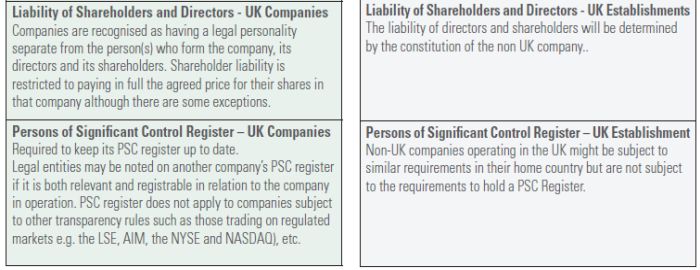1. Introduction to Establishing and Managing a Business in the UK
Overseas investors are welcome in the UK. Save for rare instances, there are no specific laws governing foreign investment in the UK nor are there any business requirements for UK participation in the ownership or management of any business established by foreign investors. Bank accounts may be held in Pounds Sterling (£) or any foreign currency.
A person resident outside the UK wishing to establish a business operation in the UK must first decide the structure that such operation should take. The next section will consider some of the legal factors involved when establishing the two most commonly selected forms of UK businesses.
These are:
A UK Registered Company
This has a separate legal identity from its shareholder(s). It can be wholly-owned or partly owned.
A UK Establishment
This is considered an extension of a non-UK company, and does not have a separate legal personality. The ability to register a UK establishment does not extend to overseas partnerships or other unincorporated bodies.
Alternatively, it may be appropriate to do business "with" the UK rather than to establish a business "in" the UK. This may involve one or more of the following agreements:
- franchise agreement to appoint a franchisee in the UK
- agency or distribution agreement
- contract of employment to appoint a sales employee in the UK
- licence of intellectual property rights to a UK licensee. Legally, the term UK includes the countries England, Scotland, Wales and Northern Ireland. This guide deals solely with the formalities that must be complied with when establishing a business in England and Wales. The required formalities for setting up a business in Scotland and Northern Ireland vary in certain respects and there are material differences in the applicable rules.
2. Factors in making the choice between a UK Company and a UK Establishment


Tax
UK tax is levied on income and capital gains - income tax and capital gains tax being payable by individuals and corporation tax by companies. The potential exposure of both UK registered companies and UK establishments to taxation upon profits is summarised below.
Taxes equally applicable to UK Companies and UK Establishments:
Capital Gains - Tax must be paid at a company's or establishment's corporation tax rate on any capital gains made on the disposal of chargeable assets.
VAT - The standard rate of VAT in the UK is currently 20% and is chargeable on supplies of most goods and services. UK businesses register and charge VAT when the value of their chargeable supplies reaches a threshold, currently £85,000. It is possible to voluntarily register before the threshold is reached in order to be able to reclaim VAT paid on purchases.
VAT is largely neutral for most businesses. VAT charged to customers and collected by the business is paid to HMRC. Businesses that have registered for VAT can reclaim or set off any VAT that they themselves are charged on purchases of goods and services. Where VAT incurred on purchases exceeds VAT charged on supplies, the business will receive a repayment from HMRC.
Import Duties - Import duties will be applied to any goods imported into the UK from countries outside the EU or other free trade groupings. The rate at which duty is charged varies according to how HMRC classifies the goods concerned.
Excise Duties - Excise duties will be imposed on the supply of certain products (e.g. tobacco, liquor and petroleum products).
Stamp Duty Land Tax - This is a tax on transactions relating to the transfer of real estate or interests in real estate, details of which are set out in Chapter 6 (Acquiring or Leasing Business and Residential Premises).
Persons with Significant Control Register ("PSC Register") - Since 6 April 2016 UK companies have been required to keep a register of individuals or legal entities that have control over them. The PSC Register is part of a wider movement to increase transparency around ultimate ownership and control of companies incorporated in the UK. The UK provisions are similar to those introduced by the EU and its respective member states.
To see the full article click here
The content of this article is intended to provide a general guide to the subject matter. Specialist advice should be sought about your specific circumstances.


